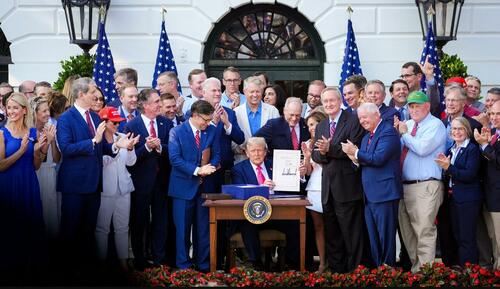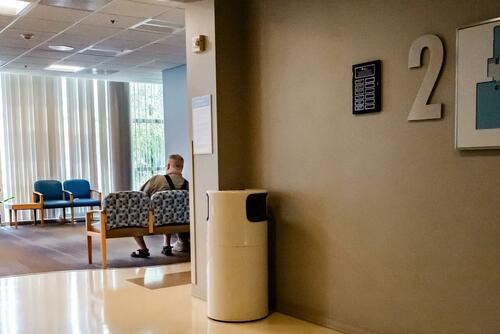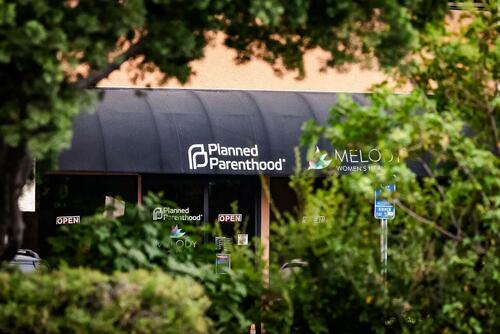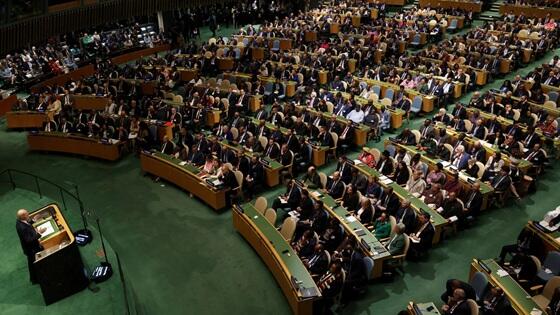
10 Non-Tax Policies In Trump’s Megabill That Will Affect Americans
Authored by Jackson Richman, Joseph Lord, Jacob Burg via The Epoch Times,
The One Big Beautiful Bill Act is notable for implementing significant changes to the U.S. tax code, including making 2017’s individual income tax brackets permanent.
But there are non-tax-related items in the bill that will impact the lives of everyday Americans, affecting travel, women’s health care, immigration, and welfare benefits.

Here are ten major non-tax areas that are addressed in the legislation, which President Donald Trump signed into law on July 4.
Air Traffic Control
The new law provides $12.5 billion to the Transportation Department to institute long-overdue reforms to the nation’s air traffic control system.
That includes $4.75 billion to upgrade copper telecommunication infrastructure to fiber optics, $3 billion for radar systems replacements, $500 million for safety technology to avoid near-misses on runways, and $100 million for advanced training technology for air traffic controllers.
At a July 8 cabinet meeting, Transportation Secretary Sean Duffy called the funding a “massive new start to rebuild air traffic control,” but said his agency will need more money to upgrade American aviation and make it the world’s leader.
Duffy has repeatedly pointed to the Federal Aviation Administration’s outdated technology and infrastructure, which still relies on floppy disks, aging copper wire, and rotary phones.
Despite the need for more funds, the bill could help reduce and avoid the sorts of delays that infamously bogged down Newark International Airport in New Jersey earlier this year.

Air traffic controllers monitor planes at Los Angeles International Airport in Los Angeles on July 1, 2025. Under the One Big Beautiful Bill Act, the Transportation Department will receive $12.5 billion to implement long-overdue reforms to the U.S. air traffic control system. John Fredricks/The Epoch Times
Border and Immigration
The legislation dedicates a total of $150 billion toward border security and immigration enforcement, aligning with some of Trump’s core promises on the 2024 campaign trail.
Approximately $80 billion of that amount is slated for domestic immigration enforcement operations.
The single biggest immigration item in the law is $46.5 billion dedicated to the construction of a border wall along the U.S.–Mexico border.
Much of the rest is slated for Immigration and Customs Enforcement (ICE), the agency largely responsible for carrying out Trump’s mass deportation operation.
That includes $45 billion allocated for detention through September 2029—a 365 percent increase over ICE’s prior annual detention funding, which sat at $3.4 billion, according to the American Immigration Council. It provides $14.4 billion for transportation and removal operations, a 500 percent annual increase.
For state and local governments that assist with deportation efforts, $13.5 billion is allocated in grants.

Border Patrol agents monitor the U.S. border wall in San Ysidro, Calif., on July 25, 2024. The new legislation allocates $150 billion for border security and immigration enforcement. John Fredricks/The Epoch Times
Education
The bill makes several notable tweaks to federal education policy.
First, it would reduce Pell Grant eligibility for high-income students and students with full-ride scholarships. The approximately $7,000 annual grant has long provided a boost to funding Americans’ higher education.
The bill also proposes two federal student loan repayment plans, including one traditional repayment plan and one income-based repayment plan, as Republicans seek to do away with President Joe Biden’s contested Saving on a Valuable Education (SAVE) plan.
Additionally, it would tax college and university endowments at a variable rate—either 1.4 percent, 4 percent, or 8 percent—based on the institutions’ wealth.
Medicaid and Rural Hospitals
Some of the changes that have drawn the most attention are those made to Medicaid funding—changes that are expected to boot millions of beneficiaries off the entitlement program while potentially impacting rural hospitals.
To reduce Medicaid spending, the bill would impose an 80-hour monthly work requirement for able-bodied adults to receive benefits; the change would take effect by no later than December 2026.
It also reduces the “provider tax”—the rate at which states tax hospitals and doctors to pay for their Medicaid programs—from 6 percent to 3.5 percent in states that expanded Medicaid under the Affordable Care Act. Ten states that didn’t expand their programs will see no changes. That change won’t go into effect until 2028.
To offset fears that the changes would harm rural hospitals, the bill allocates $50 billion over five years to support such facilities.
Estimates vary significantly as to how many individuals could lose coverage as a result of the Medicaid changes. The Congressional Budget Office forecasts that several million nationwide could lose coverage.

A man waits in a hospital in Irvine, Calif., on July 8, 2025. The One Big Beautiful Bill Act includes changes that could remove millions from Medicaid and impact rural hospitals. John Fredricks/The Epoch Times
SNAP Cuts
The One Big Beautiful Bill Act includes new requirements for recipients of the Supplemental Nutrition Assistance Program (SNAP), better known as food stamps.
In addition, the bill introduces more stringent work requirements for SNAP recipients. Currently, able-bodied recipients between 18–54 must spend 80 hours a month volunteering, working, looking for a job, or being in school. The bill widens that window to between 18-64 years of age.
Moreover, states will have to shoulder more of the burden when it comes to funding for SNAP. That means recipients could receive less in food stamps or lose access entirely, depending on the state in which they live.
‘Trump Accounts’ for Newborns
The bill also adds a pilot program for “Trump Accounts,” a type of federal trust account that comes prefunded with $1,000 from the Treasury Department for every child born between Jan. 1, 2025, and Dec. 31, 2028. Children born before this year will also be eligible, but not for the initial $1,000 seed money.
The scheme allows Americans to contribute up to $5,000 a year to these accounts.
The money must be invested in a broad stock market index, and earnings will grow tax-deferred until the account holder withdraws the funds. Beneficiaries are eligible to withdraw half the money for qualified purposes when they reach the age of 18, and can access the full balance at age 25. Withdrawals would then be subject to either capital gains or income tax rates, depending on the nature of the expense.
Expenses such as tuition, a first home purchase, or small business expenses would be subject to the lower capital gains tax rate; all other uses of the funds would be subject to normal income tax rates, including an additional 10 percent penalty for nonqualified expenses.

People walk on the Lehigh University campus in Bethlehem, Pa., on Oct. 25, 2024. The legislation will affect higher education by reducing student grants and adjusting loan repayment plans and tax codes for institutions. Madalina Vasiliu/The Epoch Times
Spectrum
One section of the bill reinstates the Federal Communications Commission’s spectrum authority, a term that describes the agency’s ability to auction off specific radio frequencies to the private sector.
The authority expired in 2023 and, with limited direction from the Biden administration, became deadlocked in Congress.
The reauthorization of the program in the bill will generate $85 billion in revenues for the federal government over the next ten years, enables expansion of 5G and 6G mobile networks, and will allow for rural areas to receive radio communications that could be crucial during natural disasters in which they might not have access to TV.
Defunding Planned Parenthood
The One Big Beautiful Bill Act ends Medicaid funding for Planned Parenthood for one year. Stripping federal funding from Planned Parenthood, which provides reproductive health services such as abortion, has been a longtime goal of conservatives.

A Planned Parenthood facility in Anaheim, Calif., on Sept. 10, 2020. The new legislation ends Medicaid funding for health care nonprofits that post more than $800,000 in profit in a year, including Planned Parenthood. John Fredricks/The Epoch Times
The legislation does not explicitly mention Planned Parenthood, but instead references abortion providers that are non-profits and received more than $800,000 in Medicaid reimbursements in fiscal year 2023.
A federal judge has since put that aspect of the legislation on hold pending further litigation.
Obamacare Changes
The law also makes several substantial changes to the Affordable Care Act (ACA), often known as “Obamacare.” The ACA Marketplace allows low-income Americans to buy discounted health insurance.
First, the legislation will require marketplace customers to re-enroll every year, much as some employees are required to reconfirm their chosen coverage for an employer-sponsored health insurance plan. During the re-enrollment process, customers will also have to re-verify their income.
It also shortens the open enrollment period—which was lengthened under Biden—by returning the period to the original Nov. 1 to Dec. 15 window.
Other provisions of the law exclude gender transition treatment from coverage, limit Marketplace tax credits to citizens and some lawful residents, and require enrollees to be current on their premium payments before re-enrolling for another year.
The changes will be implemented on a rolling basis, with some related to eligibility set to go into effect as early as December 2025.

A group of resident doctors talks with a senior doctor inside Brookdale University Hospital and Medical Center in the Brooklyn borough of New York City on July 1, 2025. Andres Kudacki/AP Photo
Expansion of Military Housing and Support Programs
The One Big Beautiful Bill Act includes a $9 billion expansion of programs surrounding housing, child care, and other benefits for members of the Armed Forces and their families.
That includes a $2.9 billion increase in the Basic Allowance for Housing and $590 million to help with temporary housing allowances for service members, to help with relocation.
It also includes more funding for the military health care system.
The expanded benefits could incentivize more people, especially with spouses and children, to join the armed services.
Tyler Durden
Sat, 07/12/2025 – 21:00


















